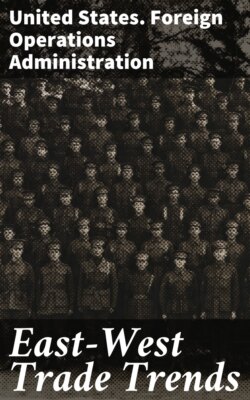Читать книгу East-West Trade Trends - United States. Foreign Operations Administration - Страница 9
На сайте Литреса книга снята с продажи.
Stalin’s Last Gospel
ОглавлениеTable of Contents
Stalin himself, in the year before he died, made some illuminating statements about the reorientation of the trade of Eastern Europe. He wrote an article, The Economic Problems of Socialism in the U.S.S.R., which was published in October 1952, though it had been written earlier in the year. In this article Stalin said that the most important economic consequence of World War II was “the disintegration of the single, all-embracing world market.” Actually there was scarcely a single world market before the war, but Stalin obviously was talking about the change in the trade of those countries that fell into the Soviet orbit during the war or shortly thereafter. He said that “now we have parallel world markets,” confronting one another. He then made the customary charge that the Western countries, through an “economic blockade,” had tried to “strangle” the Eastern European countries. He said the West had thereby unintentionally contributed to the formation of the new parallel world market. On this occasion, however, Stalin went on to say that “the fundamental thing, of course,” is not the Western economic blockade, but the fact that since the war the Eastern European countries “have joined together economically and established economic cooperation and mutual assistance.”
He made it perfectly plain that, in Kremlin thinking, the breakdown of the “one world market” and the establishment of two rival markets was a tremendous boon to the Communist cause, because it shrank the markets available to the “capitalist countries” and intensified a struggle which the Communists always see as going on among those countries. And this, Stalin said, rendered more acute what he called the “general crisis of capitalism.”
To picture the free world as in or near a general economic crisis is of course familiar Communist mythology. But Stalin’s discussion did reveal clearly the Communist indifference to the mutually fruitful and expanding international trade that the West desires. It was an admission of Communist responsibility for—or at least satisfaction with—a divided trade world.
So much for Stalin’s last economic gospel. Stalin’s death was announced on March 5, 1953. Now let us examine what has been going on in his absence.
